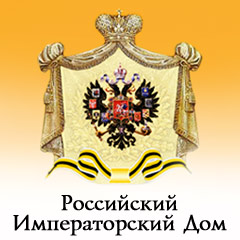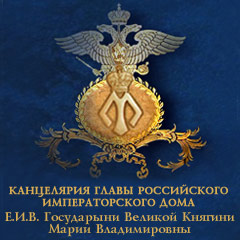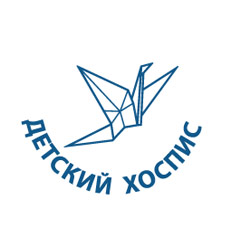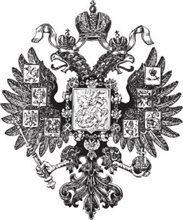A Statement from the Head of the Russian Imperial House, H.I.H. The Grand Duchess Maria of Russia, on the 70th Anniversary of Victory in the Second World War
My Dear Countrymen,
I extend my heartfelt congratulations to you all on the 70th anniversary of victory in the Second World War. After seven decades, we have indeed reached an important historical milestone. On the one hand, because we still have living among us those who experienced the war and their children, we continue to feel the pain of great loss, as well as the joy of our victory and enormous accomplishment. On the other hand, the inexorable passage of time creates in the younger generation an entirely new perception of these momentous events, a new perception based on today’s mentality, which is in many ways very different from that of the people of the 20th century. Now we have the opportunity to bring together the living memory of those who fought in the war with current perceptions from the point of view of the 1,153 years of Russia’s historical path as a state. Doing so is extremely important in order to understand correctly our own times, to crystalize our own notion of the Russian nation, and to chart the future course of our country. We must do all we possibly can to prevent either now or in the future any break in the continuity of our country’s history. The Second World War was the most terrible and bloodiest of all wars in the history of humanity. Our country suffered the brunt of the war, endured enormous suffering, and made the greatest sacrifices in the cause of its own liberation and the complete destruction of the barbaric Fascist military and political system. For Russia, this war exceeded the tolls brought upon it even by the previous global conflict—the First World War of 1914-1918. Then, the front lines winded their way far removed from the capitals and from the major population centers of the Empire. In 1941, the very existence of our nation hung in the balance. The Second World War stands alongside the Mongol conquest of Rus’ in the 13th century, the occupation by the Polish and Lithuanian invaders during the Time of Troubles at the beginning of the 17th century, and the invasion of the combined armies of Europe led by Napoleon Bonaparte in 1812. Even so, the Second World War far exceeded all these previous invasions in the number of deaths and in the extent of the destruction. This history of the Second World War generally and the invasion of Russia in particular will be written by generations of scholars to come, who will offer explanations of its causes, will painstakingly study all its many details, and will sort through the dramatic and painful contradictions of the period. But no one could deny that the most horrific manifestations of the war was the product of the abandonment of God, immorality, hatred, egoism, militant ignorance and secularism. But the feats that were accomplished and the final victory that was won were attained thanks to timeless and immutable ideals—faith, love of country, self-sacrifice, and depth of spirit. In the 20th century, Russia experienced not only the Russo-Japanese War, the First World War, and the Second World War, but also the torments of the Revolution and Civil War, militant atheism, totalitarianism, and terror. One also cannot deny that, even during peacetime, there were many senseless and meaningless atrocities; and that the modernization of the country, which was certainly necessary, was accompanied by a loss of life on an unprecedented scale, and an utter disregard for human dignity. However, neither Germany and its allies nor the Western democracies, which had since the 1930s striven to push the Third Reich and the USSR into a conflict with each other, were pursing the goal of freeing Russia from Communism. Quite the opposite: they expected that our country—bled dry and weakened, deprived of its hope in God and of its time-honoured national values—would be easy prey and be forever removed from the arena of world history. These dreams all came to nothing. Russian compatriots in Russia and abroad understood the falsehood of the slogan “Crusade against Bolshevism,” and saw the true intentions of the invaders. The majority of our people, as in past times, put away their internal differences and grievances and joined together in unison to defend their native land. And it turned out that the atheistic persecution of religion by the Communist regime had not eradicated the people’s religiosity, and that the internationalist propaganda and ideology of the “world revolution” had not destroyed their deeply-held sense of patriotism. These natural qualities in fact proved to be the key to victory. The Russian people tend toward patience and forgiveness. But at the moments of greatest danger, they always mobilize themselves selflessly for the defense of their homeland. While by no means diminishing the role in the war of military commanders and political leaders of the time, we must understand that it was precisely our great people who have, are now, and always will defeat any foreign enemy, regardless of what the government structure or political regime in our country may be. Firm in this conviction, we will get through any trials that may befall us and give answer to all invaders. The victory against the Nazi invasion, and in the Second World War generally, transformed the system of international relations and laid the basis for the peaceful coexistence of governments with widely different political structures. Even so, for many years the post-war system perpetuated a state of constant unease, which was a product of the polarity of the majority of the basic ideological foundations of the two superpowers—the USSR and the USA. Judging by the speeches of the leaders of Western countries, the fundamental differences between them lay in the rejection by the “Free World” of the official atheism in the Soviet Union, in the support by the USSR of revolutionary terrorist regimes, human rights abuses, limitations on freedom of speech, thought, and creativity, and the rejection of private property. It would seem from these speeches that, if these odious spiritual, political, and economic policies and methods should ever be abandoned, then relations between Russia and the countries of Europe and America should in every way become much more friendly and equitable. Unfortunately, noble words sometimes conceal selfish motives that have nothing at all to do with these seemingly noble proclamations. Russia has already lived for almost 25 years without the state Communist ideology. The rebirth of faith in Russia is truly a miracle of transfiguration, especially against the background of the growth in surrounding nations of materialism, amoralism, and cynicism. The foreign policy of our country is peace-loving. Freedoms and rights of the citizen are guaranteed no less in Russia than in the Western democracies. Private property and free enterprise are secure and expanding. Of course, in practice, there remain still a range of serious problems. But in concept, all the atheistic, inhumane, and utopian elements of the Communist system were abolished long ago. Despite all this, we see that a strong Russia vexes some prominent countries in the West more even than ever did the power of the USSR. Anti-Russian feelings are being whipped up around the world. And in the context of this kind of propaganda against our country, many unsubstantiated and utterly unproven accusations have been made. One has even seen a consistent trend to falsify history, making Russia out to be a kind of “age-old aggressor.” This is deeply unjust and libelous, for our people have suffered incredibly from war, and we know the value of life and treasure it deeply. The politicized rewriting of history has sometimes led to minimizing of the role of our country in the Second World War, a role that was accepted without qualification by the USA and European counties even during the height of the “Cold War.” Various anti-Russian myths multiply, grow and expand with new “details,” and create widespread misconceptions, which in turn influence the policies of nations. This is an extremely dangerous game, fraught with potentially disastrous consequences. Of course, it would be absurd to think that foreign powers would help to strengthen Russia. Geopolitical rivalry is an inevitable and inherent component of the course of history. And there is nothing surprising or bad in leaders of each country advancing the interests of their own nation, and not those of other nations. However, it is not absurd to expect common sense to prevail and to see the recognition by all of the obvious fact that Russia is a great state, which has every right to participate equally on the world stage, that its place on that stage must be taken into account and respected, and that without Russia there cannot be any kind of lasting balance of power in the world. We have the right to expect that international relations will be governed not by violence and falsehood, but by cooperation on global issues, and the resolution of all local problems should not be found on the field of battle but at the negotiation table. And we have the right to insist that the history of our country, of our alliance with the other nations aligned against Hitler, is not distorted. Remembering how the history of Imperial Russia was once so perversely presented and demeaned, the Russian Imperial House condemns all distortions and concealment of historical facts, including of course facts even about the Soviet period. We should not forget the crimes, the atrocities, and the mistakes that took place during the Communist regime, so we do not repeat them ever again. But it would be an unforgiveable sin to bury into oblivion the triumphs and efforts of our people in the Soviet period—their heroism in the global struggles against Fascism. The celebration of the 70th anniversary of the Great Victory is itself, then, a victory of sorts. It is a victory over falsehood, indifference, disunity, and neglect of one another and of the legacy of our ancestors. First of all, we must surround ourselves with love, appreciation, and care for surviving veterans of the war. They are already at an advanced age and especially need our support. For all the significance and need for parades and celebrations, these activities must not distract us from acts of kindness toward veterans, from adorning their old age with honor and care. It is also very important to find the words, symbols, and images to convey an understanding of the enduring significance of the Victory of 1945 to young people. To them belongs the future of Russia, and how that future will look largely depends on their attitude toward their glorious past. Never should fall silent the earnest prayers for the repose of the souls of the commanders and soldiers who fell in battle, of those who fell victim to the Blockade, the prisoners in concentration camps, the soldiers, officers, and commanders who died in the period after the war, the doctors and nurses, Russian women who bore on their shoulders all the hardships of war and who inspired soldiers at the front with their love and fidelity, and all those who worked in various ways on the home front. New recruits into the armed forces should take as their example the images of the heroes of the Second World War, and young defenders of our country today should know the names not only of the great commanders, but also the names of ordinary heroes, and understand in what indescribable agony this Victory was born. We must ensure the preservation of military memorials and gravesites so that the memory of those who fought in the war is immortalized with dignity, not only in the capital and major cities, but also in each and every village. There must be no repeat of the sad and conscious destruction or shameful neglect of the military cemeteries, monuments, and chapels and churches dedicated to those who had fallen in the First World War and previous wars. It would be ideal if, along with the grand monuments erected in the style of the Soviet period, there could also be religious symbols, before which the members of all religious confessions could remember their ancestors in accordance with the customs of their own faith. Memorial complexes such as that on Poklonnaya Hill, Mamayev Kurgan, at the Brest Fortress, and in many other cities might well be taken as examples of the harmonious joining of secular and religious architecture and monument design. With enormous sadness have we witnessed in some foreign countries acts of vandalism against memorials in honour of Soviet armed forces. Each and every instance of this vandalism must be condemned, and the defense and preservation of these sites must be seen as a sacred duty not only to the people of our own country, but to other peoples who were victims of Nazism. A truthful word has great power. The writing of objective scholarly works on the Second World War, the organizing of conferences, the creation of works of art, films, internet sites—all this must receive the full support of the government and the public. We must translate works about the role of the USSR in the Second World War into foreign languages in order to prevent the current strange distortions, which are born of political agitation, from becoming “generally accepted facts” not only in Russia, but in other countries as well. I am certain that these ideas will not be limited to this anniversary year but will instead gather momentum and develop into long-term projects. Happy Victory Day, dear countrymen! My son and heir, Grand Duke George of Russia, also sends you all his congratulations and warmest best wishes. May the Lord bless you! [The original is signed by Her Imperial Highness:] Maria Madrid, May 9, 2015 |









